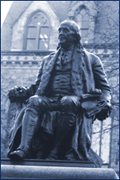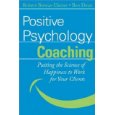I’m sometimes asked about Positive Psychology courses – either online courses, or classes in a traditional classroom setting (like at the University of Pennsylvania). Recently someone asked me about whether there were any Positive Psychology classes at Penn (home of the Positive Psychology Center and the “Master of Applied Positive Psychology” graduate degree program) that were open to the general public. I wasn’t aware of any, other than the classes for those accepted into the MAPP degree program, so I called the Positive Psychology Center at Penn to ask.
I was told that there weren’t any available at that time, but was happy to go on a mailing list (something I should start for this blog) to hear about future programs. Well, I just learned that there will be another online course in Positive Psychology this summer, led again by professor Tal Ben-Shahar, whose class on Positive Psychology at Harvard went from 8 students the first year to being the most popular course on campus two years later.
This upcoming class is open-enrollment, and has no pre-requisites. It’s completely online, so anyone in the world with an Internet connection can participate. In fact, people from over 50 countries around the world have already done so. I was part of a similar online / conference call course several years ago, and it was interesting to have participants from all over the U.S. as well as from other countries, even in my own discussion section. I wrote about that course and other programs in a previous post on “Positive Psychology courses.”
Tal Ben-Shahar’s online Positive Psychology course information:
Name: “Foundations of Positive Psychology”
Dates: June 7 – August 27, 2010 (12 weeks)
Tuition cost: $895
School: College of Liberal and Professional Studies, University of Pennsylvania
Registration: Now open
The email I received says:
Examine the history and scientific underpinnings of this intriguing field and learn how its principles have been used to enhance work and home life. This course will blend the rigor of academia and the accessibility of self-help to guide people to lead more satisfying, more meaningful, happier lives.
And goes on…
This course allows you to:
- Progress at your own pace or follow a weekly schedule.
- Communicate with the instructor, course facilitators, and classmates via blogs and discussion forums.
- Join live, interactive events.
- Create your own social networks.
Exciting features include:
- High quality streaming video lectures.
- Twitter-like live discussions with fellow students.
- Flexibility in the depth and breadth of content explored.
- Expert researchers and practitioners for instructors and course facilitation
And here are a couple of testimonials from students who’ve taken this online course in the past:
“The course has exceeded my expectations by a long shot! Tal’s lectures are well organized and I especially appreciated the routine grounding of the material in research. I have learned very much about myself and the concepts of Positive Psychology. I genuinely feel the course has changed my life. It has inspired me to enroll in the MPOD program at Case Western this fall!”
-Kevin, Assistant Dean for Planning and Institutional Effectiveness
Doha, Qatar
“It’s one thing to hear of the claims made by Positive Psychology. It’s quite another to have a world renowned expert walk you through the rich research that backs up those claims. Tal connected rigorous science with useful, daily applications of Positive Psychology.”
-Director of Professional Development at an Experiential Educational Institution
Estes Park, Colorado, USA
(Read more testimonials.)
For more information, and for course and registration details, go to U Penn’s Liberal and Professional Studies web site.
|
Dr. Ben-Shahar has authored several very popular books and taught one of the most popular courses in Harvard University’s history, all on the topic of positive psychology. He consults and lectures around the world to executives in multinational corporations, the general public, and at-risk populations on topics of happiness, self-esteem, resilience, goal setting, mindfulness, and leadership.
Dr. Ben-Shahar is a favorite speaker, and writes in a clear style that is easy to read and apply. He is the author of Happier: Learn the Secrets to Daily Joy and Lasting Fulfillment |
![[Circle]](http://www.meaningandhappiness.com/pictures/GoldCircle36i.png)

 You might remember the character played by Molly Shannon on Saturday Night Live, licensed joyologist Helen Madden. What you might not know is now you can get a professional graduate degree from an Ivy League university studying a curriculum based on research on happiness. This is not some single course with what sounds like a crackpot title you occasionally hear about in news reports. It’s a respected masters degree based on peer-reviewed science by leading researchers.
You might remember the character played by Molly Shannon on Saturday Night Live, licensed joyologist Helen Madden. What you might not know is now you can get a professional graduate degree from an Ivy League university studying a curriculum based on research on happiness. This is not some single course with what sounds like a crackpot title you occasionally hear about in news reports. It’s a respected masters degree based on peer-reviewed science by leading researchers. “Positive Psychology” is an expansion of psychology’s focus beyond a disease model, to understand how normal people can be happier, how individuals and communities can thrive. Professor Martin Seligman is a former president of the
“Positive Psychology” is an expansion of psychology’s focus beyond a disease model, to understand how normal people can be happier, how individuals and communities can thrive. Professor Martin Seligman is a former president of the 
